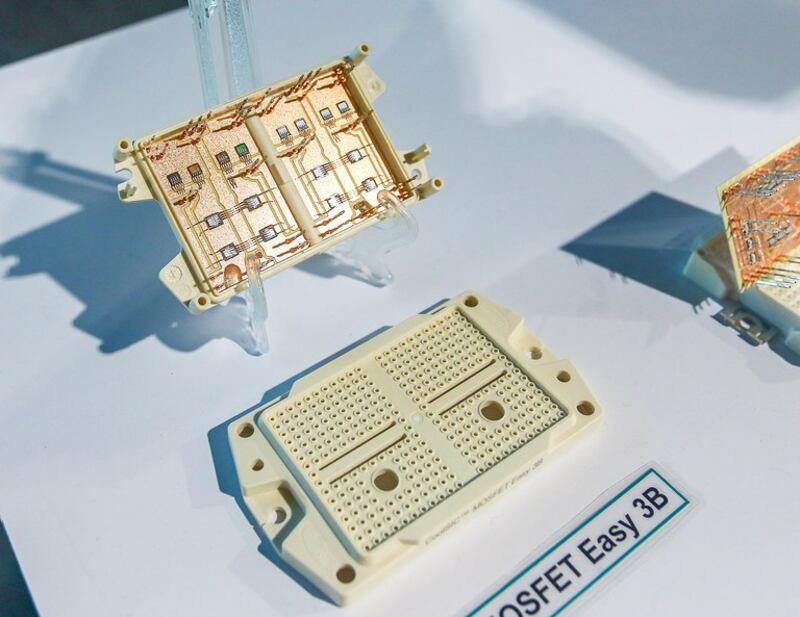German chip manufacturer Infineon Technologies on Thursday opened a U.S. $7.6 billion chip manufacturing plant in Malaysia, indicating the Southeast Asian nation continues to attract investment from countries it differs with politically, said Malaysian Prime Minister Anwar Ibrahim.
Anwar was referring to bitter differences with Germany and the United States over the war in Israel-occupied Gaza.
“German Chancellor Olaf Scholz, who also highlighted our differing views on the Gaza issue, he strongly supports Infineon’s significant investments [in Malaysia],” the Malaysian PM said during a meeting with local and international electrical and electronics companies in the northern Malaysian district of Kulim.
Infineon’s new plant in Kulim is set to become the world’s largest 200-millimeter silicon carbide power fabrication plant, according to Malaysian authorities and company officials. It is expected to generate around 4,000 jobs.
Germany and the U.S. are Israel’s key allies in its fight against the Palestinian group Hamas. During his March visit to Berlin, Anwar criticized Western countries, saying that while they condemned the Palestinian group they did not take say anything about Israel, which was allegedly committing atrocities against women, children, and civilians in the region.
Strained diplomatic relations sometimes affect foreign investment decisions especially when nations’ flagship companies are involved, observers have said. And Infineon, a top German semiconductor company, is one of Europe’s leading chipmakers.
With the U.S. too, Anwar said, “both our side and theirs are careful to protect our interests when it comes to investments.”
“Even though our stance on certain issues, like Gaza, is firm and may oppose America’s position,” he added.
Malaysia is a staunch supporter of Palestinian statehood and has no diplomatic ties with Israel. And Anwar has denounced Israel for its air and ground assaults that have killed more than 39,000 Palestinians in Gaza, following Hamas’ Oct. 7 attacks that killed around 1,100 in the Jewish state.
Malaysia has also called for an immediate and permanent ceasefire to put an end to the killing of Palestinians and the crisis.

Infineon’s investment aligns with Malaysia’s goal to become a regional hub for the semiconductor industry, according to Tengku Zafrul Abdul Aziz, Malaysia’s Minister of Investment, Trade and Industry (MITI).
“Infineon’s additional investment in cutting-edge manufacturing technologies will not only drive innovation and Malaysia’s industrial reform agenda but also create more high-skilled job opportunities for Malaysians,” Tengku Zafrul said in a statement on Thursday.
A significant player in the global semiconductor market, Malaysia is the world's sixth-largest semiconductor exporter and accounts for 13 percent of the global share of chip assembly, according to MITI and analysts.
Government data shows that in 2023, the electrical and electronics industry secured $19.1 billion (RM 85.4 billion) in approved investments, making the sector a major contributor to the country’s GDP growth.
Major investments in Malaysia's semiconductor sector recently include expansions by the U.S.-based Google and Intel, as well as AI infrastructure development by Nvidia and Microsoft, according to the authorities.
The Southeast Asian nation is also looking to capitalize on chip companies diversifying their supply chains with a “China Plus One” strategy, where companies complement their production outputs in China with investment in other countries.
U.S.-China tech rivalry
Malaysia was also seeking similar investments from China, Anwar said.
The Anwar administration anticipates investments in the semiconductor industry to reach over $100 billion in the next five to 10 years.
Earlier this week, his administration launched Southeast Asia's largest integrated circuit design park in Selangor state, aiming to capitalize on the U.S.-China technological rivalry by advancing Malaysia's semiconductor design capabilities and making the nation a preferred destination for foreign tech firms.
However, despite Malaysia's strong economic prospects, it finds itself in the crosshairs of the U.S.-China chip war, according to Zachary Abuza, a professor at the National War College in Washington and an adjunct at Georgetown University.
Last week, news agency Reuters reported that the U.S. plans to expand its powers to restrict the export of semiconductor manufacturing equipment to Chinese chipmakers, which could potentially impact Malaysia and restrict its access to American and other Western markets.
Responding to these developments, Malaysia’s Economy Minister Rafizi Ramli on Tuesday reiterated the country’s commitment to neutrality.
“Obviously, different countries have their positions, and this geopolitical tension will continue,” he told reporters. “Our position is that Malaysia is a neutral country and a very important component of the global supply chain for electronics and semiconductors.”
However, an economics expert said that while these investment projects signal strong interest from foreign technology companies, the volatile global economic environment could affect the outcome of these deals.
“It is an indication that Malaysia is attracting interest from foreign technology companies, but for now, the full investment has not been completed,” Geoffrey Williams, who teaches economics at the Malaysia University of Science and Technology, told BenarNews.
However, Williams noted that Malaysia’s low operational costs for technology infrastructure make the Southeast Asian nation an attractive destination for tech firms.
“Expensive costs for running technology infrastructure, especially electricity and water, are very cheap here. There is a huge electricity cost in data centers for example and it is one of the main unavoidable costs so technology firms need to keep these costs down,” he added.
